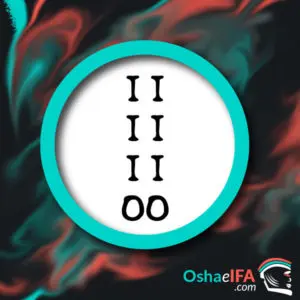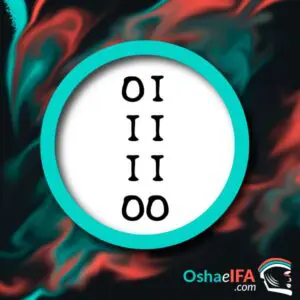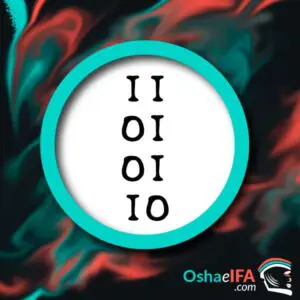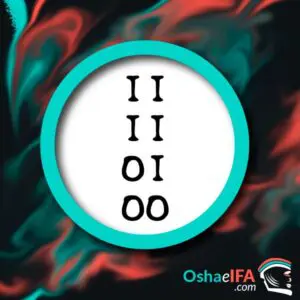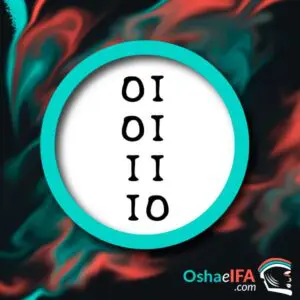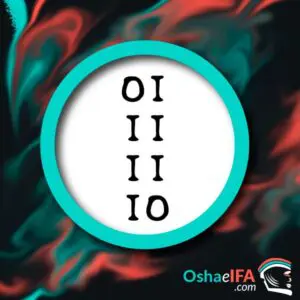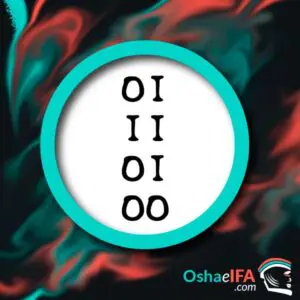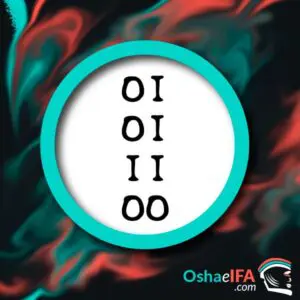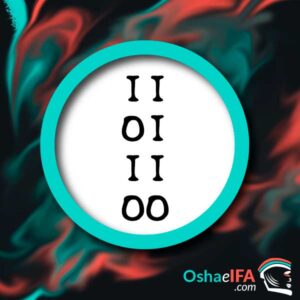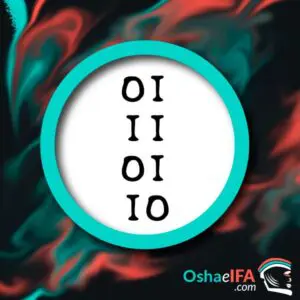Ogunda Yekun
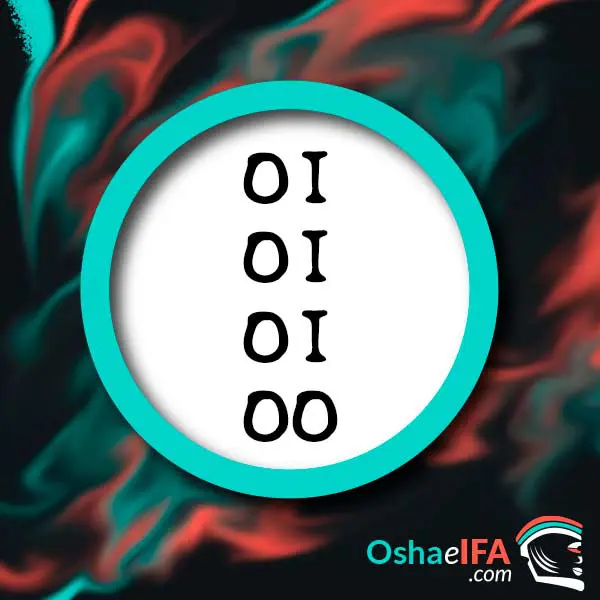
Ogunda Yekun is the Odu of Ifa that represents Orunmila on earth, underlining the presence and direct influence of wisdom and spiritual guidance in our daily lives. This sign contains profound lessons about human behavior and spirituality, reflecting both the shadows and the lights of our existence.
Treaty of the Oddun of Ifa Ogunda Yekun
What is born in the odu of Ifa Ogunda Yekun?
- Born: Vagrancy.
- Disobedience.
- The stubbornness.
- The Mayombero's ambition.
What is the sign Ogunda Yekun talking about?
- It is the representation of orunmila on earth.
- It was where the rider nailed the spurs to the horse and had to put the bridle to dominate it.
The sign Ogunda Oyekun points out:
- The plum tree and the well speak.
- Brand tie for woman.
- In Ogunda Oyekun, Eggun and Shango defend.
Other names of the Oddun Ogunda Oyekun:
- Ogunda Yekun.
- Ogunda Yeku.
You can read: Ifa Oyekun Tekunda sign
Analysis and Reflection of the Ifa sign Ogunda Yekun (Ogunda Oyekun)
This sign warns us about tendencies toward laziness, disobedience, and stubbornness, pointing out how these behaviors can divert our path and distance us from our true goals and purposes.
It speaks of the rider who must stop the horse, which is a powerful metaphor about the need to control our most instinctive passions and desires. He teaches us the importance of moderation and discipline to master internal forces that, if left unchecked, can lead us to perdition or failure.
Ogunda Yekun also addresses themes of loyalty and betrayal, both on the personal and spiritual levels. He urges us to clearly define our alliances and remain faithful to them, avoiding falling into the moral ambiguity that can lead us to act against our principles.
This sign emphasizes the connection to ancestors and the veneration of Eggun and Shango, reminding us of the power of tradition and the importance of honoring those who came before us. Disobedience to these entities and principles not only distances us from our spiritual heritage, but can also result in the loss of their protection and guidance.
Health is a recurring theme in Ogunda Yekun, with a particular focus on unrecognized or ignored illnesses that can suddenly flare up. This odun advises us to pay attention to our physical and spiritual health, seeking balance and harmony to prevent greater evils.
Excessive ambition, especially in spiritual or religious contexts, is criticized in this sign. It warns us about the dangers of being carried away by desires for power or control over others, especially when these impulses are born of vanity or arrogance.
Regarding personal relationships, Ogunda Yeku calls for moderation and mutual respect. The story of the rider and the horse extends to couple dynamics, where balance and mutual understanding are crucial to maintaining a healthy and equitable relationship.
Finally, this odun teaches us about the importance of gratitude and recognition of the efforts and sacrifices made by ourselves and others. Ingratitude is seen as a great fault that can hinder our spiritual and personal growth.
In short, Ogunda Yekun is a call to live with awareness, discipline and respect for traditions and spiritual ties. It invites us to face our weaknesses and work towards balance and harmony in all aspects of our lives, always maintaining an attitude of humility and gratitude.
Recommendations for the Ogunda Yekun (Oyekun) Sign
In the odun Ogunda Yekun, important advice and precautions are revealed that must be taken into account to promote well-being and harmony in the lives of those consulted. Here is a detailed guide based on the teachings of this sign:
- Reproductive Health in Women: Warns about possible unknown conditions that affect reproductive health, such as abnormalities in the uterus or ovaries. A medical evaluation is essential to identify and treat any conditions in a timely manner.
- Protection during Pregnancy: Pregnant women under this sign must perform an ebo with a white rooster for Obatala, accompanied by yams and guinea plantains, to request protection and blessings for themselves and their future children.
- Managing Stress and Headaches: This sign indicates the tendency to suffer from headaches, possibly related to stress. It is recommended to look for relaxation and stress management techniques.
- Personal relationships: It is advisable to maintain balance and mutual respect in relationships, avoiding excessive domination or submission. It is important to promote equality and understanding.
- Oggun Strengthening: For people ruled by this sign, it is suggested to reinforce Oggun with a horse bit, symbolizing control and protection against adversity.
- Connection with Shango: Shango's children must have an ayúa stick staff, signifying strength and spiritual power to face life's challenges.
- Vision Care: There is an emphasis on the importance of taking care of eye health, as there is a risk of vision problems. Regular ophthalmological consultation is recommended.
- Night activities: It is suggested to carry out the most significant actions during the night, taking advantage of the energy and tranquility that this period offers.
- Home Decoration and Harmony: Place flowers in the home to promote harmony, beauty and energy balance.
- Definition of Loyalties: It is crucial to clearly define who you support, avoiding duplicity or betrayal.
- Faith and Beliefs: Maintain faith and trust in spiritual beliefs, especially in times of adversity. Do not renounce religion in moments of well-being.
- Self care: Attend to any symptoms or internal discomfort, performing periodic medical checkups to prevent illnesses.
- Recognition of the Ancestors (Egun): This Ifá highlights the importance of honoring and remembering the ancestors, recognizing their guidance and protection.
- Gratitude: Be aware of the importance of thanking and valuing the efforts and blessings received.
- Spiritual Debt Resolution: Address any outstanding debt with Obatala, especially related to health problems, to avoid future complications.
What are the prohibitions of Ogunda Oyekun?
- Avoid Laziness: This odun emphasizes the importance of diligence and constant effort in all areas of life, rejecting laziness and inactivity as forms of behavior.
- Do Not Disobey: Disobedience, especially with regard to spiritual teachings and Ifá guidance, is considered a sure path to failure and disgrace.
- Refrain from Stubbornness: Stubbornness and stubbornness, especially in situations that require flexibility and openness to new ideas, are behaviors to avoid.
- Control Ambition: It is essential to moderate personal ambitions, especially those that seek power or recognition at the expense of others, to avoid falling into dishonest or harmful practices.
- Take care of your health: Emphasis is placed on the importance of paying attention to our health, avoiding ignoring symptoms or conditions that require medical or spiritual attention.
- Avoid Ingratitude: Gratitude for benefits received and recognition of the support and sacrifices of others are fundamental values that must be cultivated.
Sayings of the Sign of Ifa Ogunda Yekun:
- The chicken is born and when it is born, the beak inclines to the earth, and then war forms it, to the one who gave it being.
- In confidence is the danger.
- Live of illusions, die of disappointments.
- The man who did not taste adversity is more miserable.
- The avarice breaks the bag.
- Due to dishonest ambition, life can be lost.
- Money doesn't do everything in life.
"The man who has not experienced adversity is more miserable" tells us about the formative value of difficulties. Adversity, far from being merely an obstacle, is a source of learning and growth. Those who never face challenges may lack the depth, resilience, and empathy that are forged in the crucible of life's trials.
Ifa ethical code of odu Ogunda Yeku:
- The Awó must take care of his ethics.
You can read: Ogunda Meji
Meaning of the Sign of Ifa Ogunda Yekun (3-2):
The Ifá sign Ogunda Yekun is distinguished as an earthly manifestation of Orunmila, the supreme oracle of Ifá. The simple action of placing this odun on an athena on the ground is enough to invoke the presence of Orunmila, underlining its importance and direct connection with divinity.
In Ifá practices, particularly for babalawos, this sign implies specific rituals to strengthen protection and communication with the orishas. The children of Shango, for example, must keep a gourd with rainwater next to their deity, symbolizing purity and spiritual renewal. The Kakuanardo ceremony involves the strengthening of Ogun through offerings such as the scimitar and roast goat leg, rituals that seek to neutralize enemies and attract divine protection. Likewise, the offerings to Oshun and Oya with chickens, prepared in a particular way and accompanied by cleansing rituals, highlight the importance of purity and proper preparation in religious practice.
Ogunda Yekun addresses deep themes such as the tendency towards laziness, disobedience and obstinacy, identified as Osobos (negativities) of this sign, as well as mention of attachment to women and issues of material ambition. This duality of odun reflects the constant struggle between our spiritual aspirations and earthly challenges.
Sign of Ifa Ogunda Yekun Ire:
On the positive aspect (Ire), Ogunda Yekun suggests financial opportunities, symbolized by specific numbers that may be auspicious for the consulted. The need to perform ebos is emphasized to keep the Egun (ancestor spirits) in harmony and not obstruct the threshold of the home, as well as the importance of incorporating spiritual or spiritualist practices for women, indicating the deep connection with the spiritual world.
Ogunda Oyekun Osogbo:
This Odu in Osogbo points out physical discomfort, such as pain in the soles of the feet and cystitis, which reminds us of the importance of attending to both spiritual and physical health.
Ogunda Yekun therefore acts as a reminder of the complexity of human existence, inviting us to seek balance between our material needs and our spiritual development, while teaching us the importance of ritual preparation, spiritual protection and mindfulness. to the signals of the body and spirit.
Says Ifa Ogunda Yekun:
Ogunda Yekun, Ifá guides us towards caution in our personal relationships, alerting us to the danger of being trapped by commitments that limit our growth. He urges us to prudently manage money and maintain family harmony, underscoring the importance of not allowing relationship dynamics to disrupt our peace and stability.
This odun emphasizes responsibility towards the beings that depend on us, such as the presence of an animal in the home, and extends this care to our closest relationships, warning us about prudence in our spiritual desires and commitments. The recovery of pawned items symbolizes the resolution of pending issues, freeing us from burdens and promoting our freedom.
Ogunda Yeku advises us to be open to the blessings that can come through visits to our home, while warning us about the importance of protecting our space to avoid misunderstandings that could lead to adverse legal situations. Through these teachings, Ifá guides us towards a path of integrity, responsibility and prudence, inviting us to live consciously and harmoniously.
Prayer of the sign Ogunda Yekun:
OGUNDA YEKU OGUNDA ARIKU AGOGO FERTILIZER
LODAFUN ARIKU ADIFAFUN YALORDE KEFEREFUN
ORUNMILA.
Suyere Oddun Ogunda Oyekun:
"OSAIN TENTE MONI TENTE, OSAIN TENTE MONI
TENTE YAMA EDUN KOSHEDUN, IGI ABERE ORUN "
Ebbo of Odu Ogunda Yekun Ifa: To solve problems
16 buns are placed in ORUNMILA for 16 days, they are taken to the river with 16 cents, the person will take a bath with jobo the day they take the buns to the river. In the river, when the buns are given, ORUNMILA is asked for what the person wants.
Ogunda Oyekun's Ebbo (3-2) with OSHUN and OYA.
2 hens will be given to OSHUN and OYA, with the hens it is sarayeye cleaning them well. And they will be given to the two Oshas together. Then they are cooked unopened and one is put on each Osha. The interested party will be cleaned with yellow cloth, then everything goes to the river.
You can read: Ifa Oshe Bara sign
Pataki by Ogunda Yekun: Oya's curse on Shango's son
In ancient times, there lived a man known for his stubbornness, whose life was marked by constant conflicts and enmities. Seeking guidance, he went to Orunmila, who after consulting Ifá, identified the Odu Ogunda Yekun and warned him of an imminent misfortune that could cost him his life, due to Eshu's complaints caused by the man's actions. However, ignoring the advice, the man opted for a home remedy, trusting in an herb for protection and healing.
The situation took a dramatic turn when a woman, whom he had previously despised, ambushed him with the intention of harming him. Thanks to the timely intervention of passersby, the man managed to escape. Aware of his mistake, he returned to Orunmila, asked for forgiveness, performed the recommended Ebó and promised to respect Eshu's word from then on. It was revealed that he was the son of Shango and had disgraced Oya's daughter, with whom he lived, subjecting her to mistreatment and humiliation, while introducing her children from other relationships into his home.
The man's actions eventually incurred the wrath of Oya, who unleashed strong winds as a sign of her displeasure. Caught in the storm, the man realized the magnitude of his mistakes. Oya cursed him, declaring that Azojuano would persecute him permanently, as punishment for his failure to comply and the suffering caused to his daughter. Orunmila warned that only obedience and respect for Oya could save him, emphasizing the importance of following his advice and making offerings to him.
Explanation and Moral:
This story highlights the importance of obedience, respect and consideration for others, especially those to whom love and loyalty are owed. Ignoring wise advice and persisting in stubbornness can lead to disastrous consequences, not only for oneself but also for those around us. Oya's curse on Shango's son It reminds us that our actions have repercussions and that contempt and mistreatment of loved ones can attract the wrath of powerful forces. The story concludes with a call to reflect on our actions and the importance of correcting our mistakes through obedience and respect for deities and our loved ones.
Ogunda Yekun - Traditional Nigerian Ifa.
ÒGUNDÁ ÒYÈKÚ
Màseere mà ku
Mà sìkà mà ku
Ilè ló meni tí ó te òun pé
Díá fun Àìkúlolá tíí se ìpòntí Òrìsà
Yóó wàá lo rèé pontí Èdú
Òòsà ni Àìkúlolá móo pon otí fun
Ngbà or said kan
Èdú bá bè é ni otí
Kó bá òun pon Otí
Àìkúlolá bá pon Otí fun un
Òòsà ní hà
'Otí tíí móo pon fún òun'
'Tíí dùn'
'Ní n lòó pon fún elòmíìn yí'?
'Èsù': or dáké ni?
'Se bóun móo bun ìwo Èsù náà mu'?
Wón bá gbé ìkoko otí tú sèsè pon tán
Wón bá tò yes
Àìkúlolá ò yes mò
Ngbà tí ón tò si tán
Wón bá gbé otí dé ibi won ó ti mu ú
Ni ón bá n pé otí yìí ò dáa mó
'Olótí yìí ò motíí pon'
'You'
Ni ón tu otí dànù
Wón bá bèrè sií bu Àìkúlolá
Eni ti ti n pon oti
Ti on ti n yìn in lówó
Ti ti n put oti fun Òòsà
Ó wá pon oti fun Èdú
Ko waá dùn
Wón ní Èsù ni kí wón or lòó bá
Wón ní Èsù ní n dán nnkan báhun wò
Wón ní Ìwo Àìkúlolá rbo fÈsù
Kóo fi òpòlopò oyin rubo
Ló bá rbo
Ó rubo tan
Ayé bá ye é
Otíi rè ò te mó
Otí tí on ti bàjé
Otí bá di dídùn
Màseere mà ku
Mà sìkà mà ku
Ilè ló meni tí or tè un pé
Day fún Àìkúlolá
You are ìpòntí Òrìsà
Yóó wa lo rèé pontí Èdú
Èyí tí won ba otíi rè náà jé
Wón ní ó rbo
Kótíi náà or gives him
Ló bá foyin rubo
Èsù mòmò ló botí Àìkú jé o
Otí n be lórù
oyin momo
N mòmò n be lórù
Oyin momo.
Ifá says that this person has been undertaking a type of function for someone. He will later decide to do it for someone else; so the first person will hate you for this. It is to avoid the possibility of the first person hating him that he must make sacrifice. He must also sacrifice for the 'mouth'. He must sacrifice honey.
If I do good, I will die
If I do wrong, I will die
It is mother earth who knows who will tread on her for a long time
He made divination for Àìkúlolá, vinorìsà's wine brewer
He would go and prepare the same wine for Èdú
It is only for Òòsà that Àìkúlolá prepares the wine
But on a fatal day
Èdu asked him to prepare wine for him
He wanted to drink Àìkúlolá wine
So Àìkúlolá did it like this
Òòsà surprised, he exclaimed
'The wine this man prepares for me'
'And it's always very sweet'
'It is the same wine that he wishes to prepare for someone else'
'Ùsù, why are you silent?'
Òòsà asked 'I don't share wine with anyone?'
This is how they conspired and when the Àìkú wine was prepared
He would pee on it
Àìkúlolá had no knowledge of it
After they peed on him
He took the wine where it would be consumed
They said: 'This wine is not good,
'This brewer is a charlatan (fake)'
'You'
They spit out the wine
They began to insult Àìkúlolá
The person for whom he was preparing wine for a long time
He had been praised for it
Òrúnmìlà wondered 'He who had been preparing wine for Òòsà'
'He prepares it now for me (Èdú)'
'And it's now sour'
They said 'Go and find Èsù'
His Babaláwos said 'It is Èsù who is working on its inconsistency',
They told Àìkúlolá to offer the sacrifice to Èsù
They advised him by saying: 'Use a lot of honey as a sacrifice'
He performed the sacrifice
He ended up making the sacrifice
Life pleased him then
His wine refused to turn sour again
The wine that had been tasteless
Turned sweet again
If I do good, I will die
If I do wrong, I will die
It is mother earth who knows who will tread on her for a long time
He made divination for Àìkúlolá, vinorìsà's wine brewer
He would go and prepare the same wine for Èdú
Whose wine would be spoiled
They advised him to make the sacrifice
So that his wine was as sweet as usual
He used honey as a sacrifice
It was Èsù that spoiled the taste of Àìkú's wine
The wine is in the pot getting ready
As sweet as honey
It's really there in the pot getting ready
As sweet as honey.
